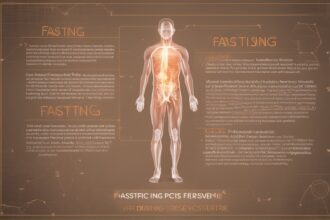Welcome to the fascinating world of fasting research! If you’ve ever wondered whether skipping meals could do more than just help with weight loss, you’re in for a treat. Over the past decade, scientists have been diving deep into the effects of fasting on the human body, uncovering benefits that go far beyond shedding a few pounds. From boosting cellular repair to improving metabolic health, fasting studies are reshaping how we think about food and wellness. In this post, we’ll explore the latest findings in fasting research, break down the science in simple terms, and share practical tips to help you apply these insights to your life. Let’s dig in!
What Is Fasting Research, and Why Does It Matter?
Fasting research refers to scientific studies that investigate the effects of abstaining from food for specific periods. This isn’t just about starvation or extreme diets; it’s about understanding how controlled fasting—whether intermittent fasting, time-restricted eating, or prolonged fasts—impacts our physiology. Researchers are particularly interested in how fasting influences metabolism, brain function, inflammation, and even longevity. The buzz around fasting science stems from its potential to address modern health issues like obesity, diabetes, and heart disease. By studying fasting, scientists aim to provide evidence-based guidelines that can help people live healthier, longer lives. What’s exciting is that this field is evolving rapidly, with new studies published regularly that challenge old assumptions about eating patterns.
Key Findings from Recent Fasting Studies
The body of evidence supporting fasting is growing, and some of the findings are downright mind-blowing. One of the most well-known discoveries in fasting research studies is the role of autophagy—a process where cells clean out damaged components and recycle them for energy. Studies, like those published in the journal Nature, show that fasting triggers autophagy, which may protect against diseases like Alzheimer’s and cancer. Additionally, research from the University of Southern California found that periodic fasting cycles can reduce markers of inflammation and improve immune system function. Another hot topic is fasting’s effect on insulin sensitivity. A 2020 study in Cell Metabolism revealed that intermittent fasting could help reverse type 2 diabetes symptoms in some individuals by improving how the body processes sugar. These fasting health studies highlight that skipping meals strategically isn’t just a trend—it’s a potential game-changer for health.
How Fasting Impacts Weight Loss and Metabolism
Let’s talk about one of the most popular reasons people turn to fasting: weight loss. Fasting and metabolism research shows that when you fast, your body shifts from using glucose (sugar from food) to burning stored fat for energy—a state called ketosis. A 2019 study in Obesity found that participants practicing intermittent fasting lost an average of 3–8% of their body weight over 8 weeks, largely due to reduced calorie intake and increased fat-burning. But it’s not just about fewer calories; fasting also seems to “reset” metabolic pathways. Research suggests it can lower insulin levels, making it easier for your body to access fat stores. If you’re curious about trying fasting for weight loss, start small with a 12-hour overnight fast and gradually work up to longer windows as your body adjusts.
Fasting and Brain Health: What the Science Says
Did you know that fasting might be a brain booster? Emerging fasting brain health research indicates that periods of food restriction can enhance cognitive function and protect against neurodegenerative diseases. A study from Johns Hopkins University found that fasting increases the production of brain-derived neurotrophic factor (BDNF), a protein that supports neuron growth and memory. This could explain why some people report feeling sharper and more focused during fasting periods. Additionally, animal studies suggest fasting may reduce the risk of conditions like Parkinson’s by decreasing oxidative stress in the brain. While human trials are still ongoing, these early findings in fasting neuroscience studies are promising. To support brain health, consider pairing fasting with a nutrient-dense diet rich in omega-3s and antioxidants when you do eat.
Practical Tips to Start Fasting Based on Research
Ready to give fasting a try? Before you jump in, let’s go over some practical tips grounded in fasting research evidence. Fasting isn’t a one-size-fits-all approach, and studies emphasize the importance of tailoring it to your lifestyle and health needs. Here are some beginner-friendly ideas to get started safely:
- Start with a simple 12:12 schedule—fast for 12 hours overnight and eat during a 12-hour window. This mimics natural circadian rhythms, as supported by metabolic studies.
- Stay hydrated! Research shows dehydration can mimic hunger, so drink plenty of water, herbal tea, or black coffee during fasting periods.
- Break your fast with balanced meals. Studies suggest high-protein, low-sugar foods help stabilize blood sugar and prevent overeating.
- Listen to your body. If you feel dizzy or overly fatigued, fasting research advises scaling back and consulting a healthcare provider.
Potential Risks and Considerations from Fasting Studies
While the benefits of fasting are exciting, it’s not without risks, and fasting safety research highlights the need for caution. Studies warn that fasting can lead to nutrient deficiencies if not paired with a well-rounded diet. It’s also not suitable for everyone—pregnant women, individuals with eating disorders, or those with certain medical conditions should avoid it. A 2021 review in The American Journal of Clinical Nutrition noted that some people experience irritability, headaches, or low energy during initial fasting phases, often called the “keto flu.” To minimize risks, consider these precautions backed by scientific insights:
- Consult a doctor before starting, especially if you have chronic conditions like diabetes, as fasting can affect medication needs.
- Avoid extreme fasts without supervision. Research shows prolonged fasting (over 72 hours) can stress the body if not done properly.
- Monitor your mental health. Studies indicate fasting can trigger anxiety in some individuals, so prioritize self-care.
- Don’t overdo it. Fasting research suggests moderation—over-fasting can slow metabolism over time.
- Supplement wisely. Some studies recommend electrolytes or multivitamins during longer fasts to prevent imbalances.
As we wrap up this deep dive into fasting research, it’s clear that the science behind fasting offers incredible potential for improving health, from weight management to brain function. However, the key takeaway from all these fasting health studies is balance—fasting isn’t a magic bullet, but a tool to be used thoughtfully. Whether you’re intrigued by the metabolic benefits or curious about autophagy, start small, stay informed, and listen to your body. The field of fasting science is still unfolding, and as more research emerges, we’ll gain even deeper insights into how this ancient practice can fit into modern life. Have you tried fasting, or are you inspired to start? Drop your thoughts or questions below—we’d love to hear from you!






